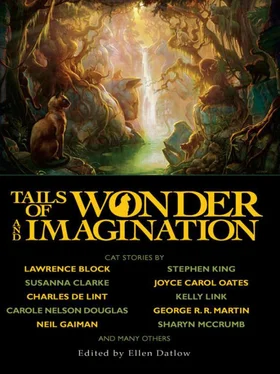Ellen Datlow - Tails of Wonder and Imagination
Здесь есть возможность читать онлайн «Ellen Datlow - Tails of Wonder and Imagination» весь текст электронной книги совершенно бесплатно (целиком полную версию без сокращений). В некоторых случаях можно слушать аудио, скачать через торрент в формате fb2 и присутствует краткое содержание. Год выпуска: 2010, ISBN: 2010, Издательство: Night Shade Books, Жанр: Фэнтези, Фантастика и фэнтези, Ужасы и Мистика, на английском языке. Описание произведения, (предисловие) а так же отзывы посетителей доступны на портале библиотеки ЛибКат.
- Название:Tails of Wonder and Imagination
- Автор:
- Издательство:Night Shade Books
- Жанр:
- Год:2010
- ISBN:978-1-59780-170-6
- Рейтинг книги:5 / 5. Голосов: 1
-
Избранное:Добавить в избранное
- Отзывы:
-
Ваша оценка:
- 100
- 1
- 2
- 3
- 4
- 5
Tails of Wonder and Imagination: краткое содержание, описание и аннотация
Предлагаем к чтению аннотацию, описание, краткое содержание или предисловие (зависит от того, что написал сам автор книги «Tails of Wonder and Imagination»). Если вы не нашли необходимую информацию о книге — напишите в комментариях, мы постараемся отыскать её.
collects the best of the last thirty years of science fiction and fantasy stories about cats from an all-star list of contributors.
Tails of Wonder and Imagination — читать онлайн бесплатно полную книгу (весь текст) целиком
Ниже представлен текст книги, разбитый по страницам. Система сохранения места последней прочитанной страницы, позволяет с удобством читать онлайн бесплатно книгу «Tails of Wonder and Imagination», без необходимости каждый раз заново искать на чём Вы остановились. Поставьте закладку, и сможете в любой момент перейти на страницу, на которой закончили чтение.
Интервал:
Закладка:
In the evening I returned to the Shades Club, only to find it closed. The malfunctioning neon sign had been switched off. I couldn’t find anyone around the place to ask when it was going to open again. I scoured the town for signs of Lilly, or of Wheeler, or even for the other girl in the bar. Exhausted I returned to my room, where I fell into a hot, feverish sleep lasting some days.
I don’t know if this happened to me a year ago, or just the night before last. Time has a way of becoming a concertina, of expanding and diminishing moments in this town. I spend the hours drifting in the streets, returning to the Shades Club of an evening, never to find it open. I ask the waiters at the other bars if they know anything about it. Someone was working there that night I met Lilly, but no one seems able to tell me anything. They regard me sadly, pour me a drink, sometimes they give me a meal.
I’ve made efforts to get out of this town, but every time I resolve to leave, then I’m distracted, by another hair on my tongue, or an involuntary twitch of my tail muscle. I don’t know when the tail first appeared. I woke up one morning and it was there, as if it had always been there. I keep it self-consciously coiled inside my trousers as I go about the town, hoping its movements won’t betray me.
But the discomfort of the tail is nothing compared to the hollow ache, the hunger, the yearning to make one moment snap together with another to form a chain of some consequence, some meaning. For I catch myself, washed up on this street or in that club, with no sense of why I came there, or what it is I’m looking for.
I am haunted by the desire to know what I am doing in this place.
I haven’t seen Ben Wheeler since that night. I know he struck some kind of a deal involving me, which helped him get out of town. Meanwhile I wait. I wait for the Shades Club to open its door again. I wait for an old acquaintance to turn up at one of the waterfront bars, so that maybe this time I can strike the deal. And every now and then, something appears on the tip of my tongue, a hair, a strand of fur, like something half remembered, or like the first words in a strange, impossible story I’m about to tell. A story about the town of Candia, with its sleepy waterfront, and its lost bars and missing streets, and its ruined temples dedicated to gods glimpsed only once in a lifetime. A story about Candia, the town that couldn’t decide its allegiance between the Greeks and the Turks, and so invited its own downfall.
But then a kind of waking sleep washes over me. And I find myself back again in one of the bars on the waterfront, nursing a glass of raki while the resitica man decants from his bursting heart in this town of forgotten miracles.
MBO
Nicholas Royle
Nicholas Royle, born in Manchester in 1963, is the author of five novels—including Counterparts , The Director’s Cut , and Antwerp —and two novellas— The Appetite and The Enigma of Departure . He has published around 120 short stories, 20 of which are collected in Mortality . Widely published as a journalist, with regular appearances in Time Out and the Independent , he has also edited twelve original anthologies, including two Darklands volumes and The Tiger Garden: A Book of Writers’ Dreams . The winner of three British Fantasy Awards, he teaches creative writing at Manchester Metropolitan University. He has a black cat called Max.
“Mbo,” one of the more visceral and violent stories in this anthology, is a good example of Royle’s talent as crackerjack storyteller and brings together two legends.
He says: “Islands are interesting precisely because they are isolated. Evolution can follow a different path. The Javan tiger (extinct), the Tasmanian tiger (widely believed to be extinct and actually a marsupial rather than a cat), the Zanzibar leopard (probably extinct, but you never know). The Zanzibar leopard was smaller than its mainland counterpart and its spots were different, too. A search for evidence of the cat’s presence on the island in the 1990s uncovered no trace, but it’s hard, when you stand on the edge of the Jozani Forest gazing in, not to imagine the leopard lurking somewhere within.”
It was a question of arriving at the right time. You didn’t necessarily, for example, turn up at the same time each evening, but juggled various considerations, such as the heat, the number of clouds in the sky, even what type they were, whether they were cumulus or stratus or cirro-stratus—stuff like that. You wanted to turn up just at the right moment, just in time to get a seat and a good view and not a moment too soon. After all, the terrace of the Africa House Hotel was not a place you wanted to spend any more time than you absolutely had to. It simply wasn’t that nice.
It wasn’t nice partly because you were surrounded by all those people you had gone to Zanzibar to get away from—white people, Europeans, tourists; mzungu, the locals called them, red bananas. White inside but red on the outside, as soon as they’d been in the sun for a couple of hours. Apparently there was a strain of red-skinned banana that grew on the island.
And partly because the place itself was grotsville. In colonial days, the Africa House Hotel was the English Club, but since the departure of the British in 1963, it had been pretty much allowed to go to seed.
But you didn’t go there for the moth-eaten hunting trophies on the walls, or the charmless service at the counter, but to sit as close to the front of the terrace as you could, order a beer and have it brought to you, and watch the sun sink into the Indian Ocean. Over there, just below the horizon—the continental land mass of Africa. Amazing really that you couldn’t see it, thought Craig. It didn’t really matter how far away it was—twenty miles, thirty—looking at it on the map, Zanzibar Island was no more than a tick clinging to the giant African elephant.
Craig ordered a Castle lager from the waiter who slunk oilily around the tables and their scattered chairs. He was a strange, tired-looking North African with one of those elastic snake-buckle belts doing the job of keeping his brown trousers up. Similar to the one Craig had worn at school—8,000 miles away in east London.
He didn’t like ordering a Castle, or being seen with one (they didn’t give you a glass at the Africa House Hotel). It was South African and everyone knew it was South African. He supposed it was all right now, but still, if people saw you drinking South African beer they’d assume you were drinking it because that’s what you drank back home. In South Africa. And whereas it was all right to buy South African goods, it still wasn’t all right to be South African.
And Craig wasn’t, and he didn’t want anyone to think he was, but not so badly that he’d drink any more of the Tanzanian Safari, or the Kenyan Tusker. One was too yeasty, the other so weak it was like drinking bat’s piss.
This was his third consecutive evening at the Africa House Hotel and he was by now prepared to let people think he was—or might be—South African. He wasn’t staying there, no way, uh-uh—he was staying at Mazson’s, a few minutes’ walk away. Air-con, satellite TV, a bath as well as a shower—and a business centre. The business centre was what had clinched it. Plus the fact the paper was paying.
Craig slipped the elastic band off his ponytail and shook out his fair hair, brushed it back to round up any strays, and reapplied the elastic. He took off his Oakley wraparound shades and pinched the bridge of his nose between thumb and forefinger. Stuck them back on. Squinted at the sun, still a few degrees above the bank of stratus clouds which would prevent the Africa House Hotel crowd from enjoying a proper sunset for the third evening in a row.
Читать дальшеИнтервал:
Закладка:
Похожие книги на «Tails of Wonder and Imagination»
Представляем Вашему вниманию похожие книги на «Tails of Wonder and Imagination» списком для выбора. Мы отобрали схожую по названию и смыслу литературу в надежде предоставить читателям больше вариантов отыскать новые, интересные, ещё непрочитанные произведения.
Обсуждение, отзывы о книге «Tails of Wonder and Imagination» и просто собственные мнения читателей. Оставьте ваши комментарии, напишите, что Вы думаете о произведении, его смысле или главных героях. Укажите что конкретно понравилось, а что нет, и почему Вы так считаете.












